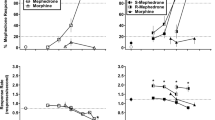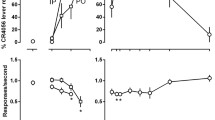Abstract
Several non-competitive NMDA receptor ion channel blockers, competitive NMDA antagonists and compounds acting at other sites on the NMDA receptor complex were examined for their ability to substitute for the discriminative stimulus effects of dizocilpine. Swiss-Webster mice were trained with food to discriminate the non-competitive NMDA receptor antagonist, dizocilpine (0.17 mg/kg), from saline in a T-maze. Mice rapidly acquired the discrimination with minimal amounts of drugs required for training and testing. Several non-competitive antagonists dose-dependently substituted for dizocilpine with a rank order of potency of dizocilpine>TCP>(–)-MK-801>SKF 10,047>dextrorphan>PCP. There was a positive correlation between the potencies of the compounds that substituted for dizocilpine and their previously reported affinities for the [3H]dizocilpine binding site of the NMDA receptor ion channel. Compounds acting at other sites on the NMDA receptor complex, including NMDA, the partial agonist at the strychnine-insensitive glycine site, ACPC, and the polyamine antagonist, ifenprodil, failed to substitute fully. In addition, the AMPA antagonist, NBQX, the monoamine uptake inhibitor, cocaine, and the GABAA receptor agonists, diazepam and phenobarbital, failed to substitute fully for dizocilpine. However, like the ion channel blockers, the competitive NMDA antagonists, CGS 19755, NPC 17742, (±)CPP and LY 233536 dose-dependently substituted for dizocilpine. The competitive antagonist, LY 274614, and its active enantiomer, LY 235959, failed to substitute for dizocilpine, each producing severe disruptions in locomotor activity. That most of the competitive antagonists substituted for dizocilpine is in accordance with other behavioral data (e.g., ataxia, locomotor activity) documenting similarities in the effects of non-competitive and competitive antagonists. These findings are also consistent with results of clinical investigations suggesting overlap in the behavioral and subjective profiles of competitive and non-competitive NMDA blockers.
Similar content being viewed by others
Author information
Authors and Affiliations
Additional information
Received: 29 October 1996 / Final version: 9 April 1997
Rights and permissions
About this article
Cite this article
Geter-Douglass, B., Witkin, J. Dizocilpine-like discriminative stimulus effects of competitive NMDA receptor antagonists in mice. Psychopharmacology 133, 43–50 (1997). https://doi.org/10.1007/s002130050369
Issue Date:
DOI: https://doi.org/10.1007/s002130050369




